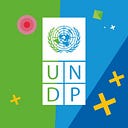Hacking COVID-19 in Somalia: Hackathon Winners Announced
With a health infrastructure devastated by decades of war, Somalia faces incalculable damage to its people and institutions if it cannot stop COVID-19 in its tracks. Rapid and innovative responses are urgently needed on the ground to prevent a humanitarian disaster.
UNDP Somalia’s Accelerator Lab has joined forces with the Institute of Innovation, Technology and Entrepreneurship, Harnhub and Hanaqad, to tap into the talents of young Somali innovators to help ‘hack’ this crisis and come up with ideas and solutions that may help communities prepare, respond and recover better.
Over 300 applicants from all over Somalia have applied to take part in the hackathon.
And over the past 72 hours, ten teams of young Somalis from the innovation community, engineers, designers and students have been combining their diverse skill-sets in an attempt to fight Covid-19 with out-of-the box solutions.
They all used the Nesta Collective Intelligence Playbook as a guide on this journey.
What ideas and solutions have they come up with?
Team #1 worked on addressing the shortage of face masks that has arisen in Somalia due to affordable masks being difficult to import. The team have prototyped a semi-automatic machine that can produce up to 250 facemasks per minute from locally available resources.
Team #2 focussed on prototyping a mobile app to provide all the latest verified info on Covid-19 in Somali language as well as online doctor consultations for basic medical advice to avoid overcrowding medical centres.
Team #3 have been developing interactive software to help assess the preparedness levels of healthcare facilities for responding to Covid-19.
Team #4 have prototyped a mask using local and affordable materials and following a design tailored specifically for women wearing Niqabs.
Team #5 have prototyped a ‘disinfection tunnel’ that could be placed at the entrances of hotels, restaurants, schools and other crowded places to help minimize the risk of infection.
Team #6 have been working on prototyping masks and gloves made from local resources with the aim of making these available at much lower prices.
Team #7 have prototyped a ‘visitor-counter’ with motion sensors to enable institutions and shops to monitor and display how many people are currently inside and thus minimise the risks of overcrowding in closed spaces.
Team #8 focused on overcoming the lack of affordable hand sanitizers and disinfectants in Somalia by prototyping a new type of disinfectant made of locally available resources.
Team #9 focused on prototyping facemasks designed to meet the specific needs of people with disabilities, including a transparent facemask to enable people with hearing impairments to lip-read while staying safe.
Team #10 has been working on developing an e-learning platform to make the latest international e-courses available to healthcare practitioners and serve as an interactive platform for them to exchange their experiences.
The hackathon jury, composed of innovation experts and university professors, had a really difficult task deciding on the winners, but after long deliberation the prizes were awarded to the following teams:
First Prize to Team #8 composed of Abdirahman Adam Ibrahim, Belah Elmutaz Mohammed, Faduma Abdulahi Yusuf, Mohamed Abdishakuur, and Nasra Hassan Jama for developing a local medically approved formula for affordable hand sanitizers.
Second prize to Team #7 composed of Nuradin Mohamed Abdikadir, Abdiwahab Ahmed Hussein, Abdifatah Abdulkadir Ahmed, Abdullahi Abukar Fiqi, and Fadumo Hassan Abdullahi for their ‘visitor-counter’ to help keep people avoid over-crowded places.
Third Prize to Team #9 composed of Zeinab Mohamud Mohamed, Aisha Abdullahi Mohamed, Zeinab Hassan Mohamed, Abdirahman Omar Ibrahim, Amal Shire Nor, Mohamed Mustafa Haji, and Fathi Salad Mohamed for transparent facemasks to help people with hearing impairments stay safe during the pandemic.
What happens next?
The winners will receive seed funding and mentorship to help them develop their solutions further.
Stay tuned for updates and if you wish to reach out to any of the teams, get in touch with us at acclab.so@undp.org.
